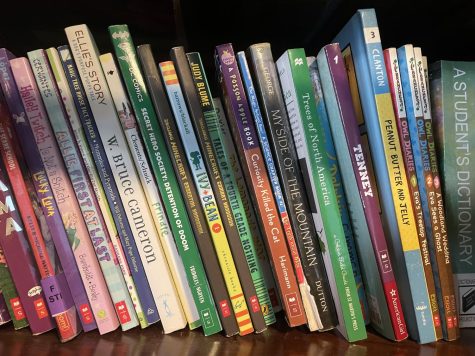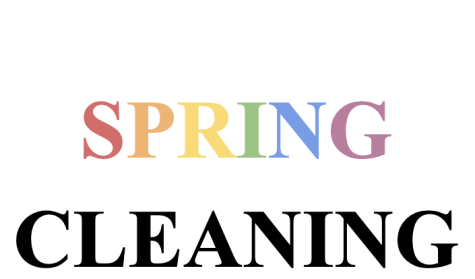SpringBoard? More like Spring-bored!
November 26, 2014248 Views
Every day, the bell rings and many students head to English class with the knowledge that a fat workbook full of gridded worksheets and fill in the blank activities is waiting for them. Most of them face this reality with grim resolution; they will “get through it,” putting in as little effort as possible to get the grade that they want. As the students settle into their seats and hear the lesson plan for the day, they quietly resign to their given task but secretly wonder if their educations could be better.
This is the reality of the Springboard curriculum, a College Board “Pre-Advanced Placement (AP)” program designed to align with common core standards. Increasingly, students and teachers at PHS are questioning whether the Springboard route is best for them as writing test scores fall and students become more withdrawn from their learning. Though Springboard has some benefits, many students and teachers believe that it is detrimental to PHS students’ education.
Like any other program, Springboard has its strengths and weaknesses. “The strengths are that it provides options for differentiated instruction, guidance, support for new teachers, and a wide variety of activities addressing the same concept.” said Kimberly Napier, AP Language and Composition and 11th grade English teacher.
Other advantages include that the curriculum is accessible to students of weaker English ability, is standardized across the country, and provides clear rubrics to explain the expectations for high-quality work.
Unfortunately, the benefits of Springboard stop there.
Although the curriculum has noble intentions, it has fallen short of its purposes of allowing teachers to reach students of different ability levels and preparing students for college and AP-level coursework. “Springboard trains but doesn’t teach.” said Napier. “It can provide a foundation but focuses too much on the spacial intelligence and not enough on the linguistic, existential, and logical mathematical intelligence.”
Napier has been teaching in this district for six years and taught at Tacoma Community College (TCC) for five of those years. In that time she has noticed an important trend. “Students coming to TCC from Springboard districts lack the depth and connections of critical thinking, reading, and writing. This is because the program encourages development at the lower levels of Bloom’s taxonomy and only peripherally addresses the upper level of evaluation, connection, and synthesis.” For this reason, Napier feels that there is no such thing as “Pre-AP.” There is only AP and non-AP.
This disparity is only too visible in my AP Language and Composition class. Having taken Springboard English in our freshman and sophomore years, my classmates and I are overjoyed to learn at a deeper and more advanced level, yet we are becoming increasingly frustrated as we find that we are ill-equipped to do so. For instance, when our teacher first mentioned the three major rhetorical appeals of ethos, logos, and pathos, no student was able to give more than a one-word definition of each appeal, even though Springboard had “taught” us these appeals since middle school. We were amazed when we saw that an entire whiteboard could be filled with information that we had not learned on the subject.
What is Springboard doing wrong if it teaches these things every year?
For one, it only scratches the surface of major concepts and completely omits others.
“In spite of revisions or improvements made over the past few years, there remain significant lapses in certain areas of instruction, such as grammar, the focus on diction, and concepts like the appeals of rhetoric.” Napier said.
Napier also explained that students are filling in too many charts, reading too many excerpts from literary canon, answering too many lower-order thinking questions, watching too many film clips, and not reading enough books on their own. All of this “busy-work” ensures that students become very skilled at filling in boxes and blanks without actually learning anything.
Another problem is that when discussing Springboard, the word “claustrophobic” comes up a lot. The curriculum is overly structured to the point that it gives both student and teacher very little room to breathe. “My opinion is that Springboard deprives students of the right to create their own thoughts. It uses repetitive methods that force students to think inside a claustrophobic box.” said senior Simone Bogar.
It only scratches the surface of major concepts and completely omits others.
— Lucy Arnold
In my own experience, I have found that much of my most productive learning occurs during spur-of-the-moment, spontaneous discussions in which the teacher and students constantly question and answer each other until they have reached the true essence of the topic. Springboard gives little to no room for such discussions, favoring pre-prepared lesson plans that the teacher “administers” to the class.
I have also found that filling in charts does little to facilitate the writing process; good writing is the result of a messy process that is unique to each individual and too complex to occur inside a box. I believe that students should be guided in discovering their own specific writing process rather than being forced to conform to the one prescribed by a standardized curriculum. I have seen students’ eyes light up when they find their own writing voice and create a piece that they are proud of because it is truly theirs. When this happens, they become more engaged in their learning and more eager to express their thoughts on and off paper. Springboard deprives them of this joy by imposing too much structure on their thinking. It dumbs them down by spoon-feeding them strategies that provide an easy way to a grade and lead them away from their own distinct styles.
Perhaps the biggest problem is that students and teachers dislike the curriculum. In my three years at Peninsula, I have never met a student who liked Springboard. Some of the most common complaints are that the curriculum oversimplifies things and is too rigid and superficial.
“Springboard is too repetitive and boring.” said junior Mackenzie Mills. “If it were a cookie, it would be the one with raisins instead of chocolate chips.”
In short, Springboard is a disservice to students. By “playing to the lowest common denominator”, it hinders students’ academic and intellectual growth and creates a disconnect between students and their English education. The students don’t take the curriculum seriously because it is so monotonous and easy. They are in it only for the grade, not for the learning, because the learning itself is not exciting and inspiring. Is this really an attitude that we want to see in the future generation? Shouldn’t learning be fun? Shouldn’t teachers have the choice to teach at the levels they are capable of? Don’t students deserve a more active role in their educations? I know that high school students will rise to the occasion if given more advanced coursework. We deserve the chance to learn at a deeper level and to expand our intellectual capacities beyond the minimum dictated by the state. We have outgrown Springboard and deserve the choice to leave it behind and open a new, more stimulating chapter in our scholastic careers. If this happens, students will be more likely to strive for knowledge and success, which is what education is supposed to be about.













Emily Brandt • Feb 12, 2019 at 9:25 am
Mr. Blair is missing the entire point here! There was no research done on SpringBoard before it was released. The piece Ms. Arnold wrote was filed under “Opinion.” You don’t analyze the flaws of SpringBoard yourself, Mr. Blair. Snipets of “To Kill a Mockingbird” in the freshman edition , albeit an outdated and slanted view of racism stuck in the past written by a white woman, it is not worth reading a few chapters of any book that you are being asked to analyze in any literary analysis. In a Humanities class that relies on the analysis of scholars and experts for a different purpose, snippets may be acceptable. Reading the whole piece is still a requirement in order to complete any serious analytical treatment of it. Reading “To Kill a Mockingbird” is fine, but without a more contemporary piece such as something written by Ta Nehisi Coates to open a dialogue on the subject would justify it. Furthermore, in the freshman edition, there is such clear discrimination against students who don’t have family members who had a coming-of-age experience in college. They have to resort to interviewing someone else. The whole idea is to build understanding between generations. That project is fraught with so many problems I can’t even go into them all, but it isn’t appropriate for a school district where 90% of students are living below the poverty level. The articles are now irrelevant and outdated. So much wasted time when we could be studying more current literature paired with classics and doing research on issues that are in our families, communities and country. My student detested it and made a final ceremonial trip to the dumpster on the last week of school hurling them into it with the force of Thor!
brayden • Dec 12, 2018 at 11:24 am
i completely agree
Cynthia • Apr 4, 2016 at 7:38 am
YES. YES. A million times yes. Let’s take all of the joy and literacy out of ELA and replace it with no reading and charts. I’m leaving my job because we are stuck in a five year contract with Springboard.
Mr. Blair • Dec 5, 2014 at 9:57 am
I feel like I read this piece, perhaps with a bit less vitriol, five or six years ago.
While at least in part, a school newspaper is necessary to give students a voice and to recognize a student’s opinion, I want the opinions to be researched and based a bit more on fact and logic (logos) and a bit less on feelings (pathos) while taking in to account those who have some in depth knowledge of teaching and curriculum (ethos). Miss Arnold’s opinion piece, though well written in terms of syntax and diction, is most heavily weighted in feelings. She quotes one teacher, two students, offers her own opinion, and includes unattributed quotes (busy work, playing to the lowest denominator). While opening up her research may not have resulted in a different opinion, it would have lent more credibility to the argument she is trying to build.
Had Miss Arnold sought me out, and taken a moment to ask for my thoughts, I would have been happy to speak to her. I too teach at the college level, and have been teaching secondary school for more than thirty five years and have a Master’s degree in English. While that may not make me an absolute expert in the minds of some, a fact I would readily admit, I do have sufficient background experience to comment on the teaching of English as I have seen a number of programs come and go. Additionally, I would have been interested to know a bit more about the students Miss Arnold interviewed. What grades have those students received in English? If they achieved As or Bs, and thought the curriculum was too easy or simple, should their grades be adjusted? What if their grades were low? Would that mean the curriculum was too difficult and thus perhaps justify the student’s dislike? I would also be interested to know if Miss Arnold discounts her ninth and tenth grade English experience. It seems to me that because she is able to write fairly well, she must have learned something of value.
While I do not believe a curriculum exists that is a panacea for all English ills, I do believe that here we have a staff of English teachers that due to the individual strengths each of them possess, is able to make Springboard effective for students that are willing to work and learn. The book is a framework; the manner in which it is used might define it as a curriculum.
Caroline Wright • Dec 4, 2014 at 8:32 am
This article was great you guys!! I absolutely loved it an agreed with everything in it. I also liked the author’s writing style, it made it very informative and interesting to read. As a freshman in college, I cannot stress more how I do not remember a thing that collegeboard taught me, but I remember a lot from AP English (especially Ms. Napier’s class). Once again, good job!